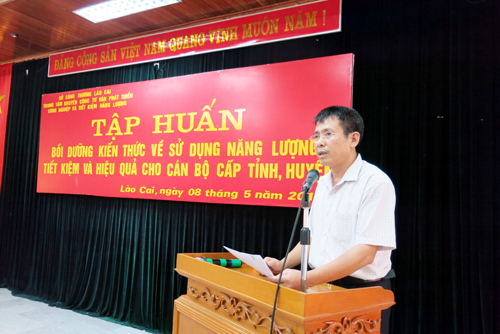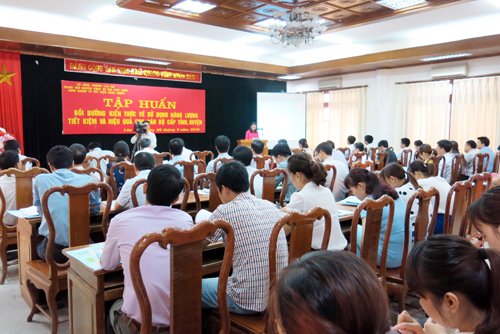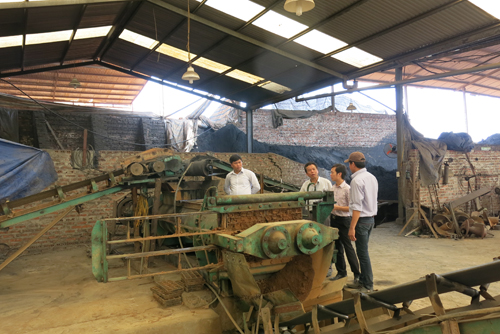Thursday, 26/02/2026 | 11:37 GMT+7
In the beginning of May, 2015, the Hanoi Energy Conservation Centre in collaboration with the Industrial Extension & Development Consulting and Energy Conservation Center held a training course on "Capacity Improvement for Energy Saving Policy Enactment for provincial and district officials in Lao Cai Province".

Mr. Dao Xuan Duc - Deputy Director, Lao Cai Industrial Extension & Industrial Development Consulting and Energy Conservation Center in his speech to open the course
Through the training course, participants are instructed on the process and method of policy formulation, short-term and long-term program planning to deploy the economical and efficient use of energy program. Especially, it is the method for integration of the Economical and Efficient Use of Energy Program and the Cleaner Production Programs and the Climate Change Response Program.

Besides, the experts also shares the methods to the trainees on how to enact the policies and to carry out the plans in a convenient way, which can bring about the highest efficiency.
Within in the cooperation framework, the experts from Hanoi Energy Conservation Center transferred to the staff of Lao Cai Industrial Extension & Industrial Development Consulting and Energy Conservation Center the mandatory steps in energy audit.
The experts provided instructions for energy audit practice at Thanh Cong Trade JSC.

Energy audit practice at Thanh Cong Trade JSC
Several solutions have been proposed in the energy audit practices, including: Optimal Operation of Equipment in feeder line by using inverters to reduce the free wheeled motor; Optimization of brick firing process by means of inverter to control the appropriate air flow into the kiln; Streamlining the process of transporting, unloading bricks between the shaping and wagon loading to save time and labor; Replacement with new wagons to reduce the heat loss after the wagon going out of the tunnel kiln. As estimated, the proposed solutions would help companies save about 15% energy consumption compared to current amount.
Do Trong Tan








 Consultation on the methodology for developing and updating energy consumption standards for four major industrial sectors
Consultation on the methodology for developing and updating energy consumption standards for four major industrial sectors
 Opening of the 2025 Energy-Efficient Equipment and Green Transition Exhibition Fair
Opening of the 2025 Energy-Efficient Equipment and Green Transition Exhibition Fair
 Energy-saving solutions and green transition promotion
Energy-saving solutions and green transition promotion
 The 9th VEPG Steering Committee Meeting: Strengthening Coordination for Viet Nam’s Just Energy Transition
The 9th VEPG Steering Committee Meeting: Strengthening Coordination for Viet Nam’s Just Energy Transition